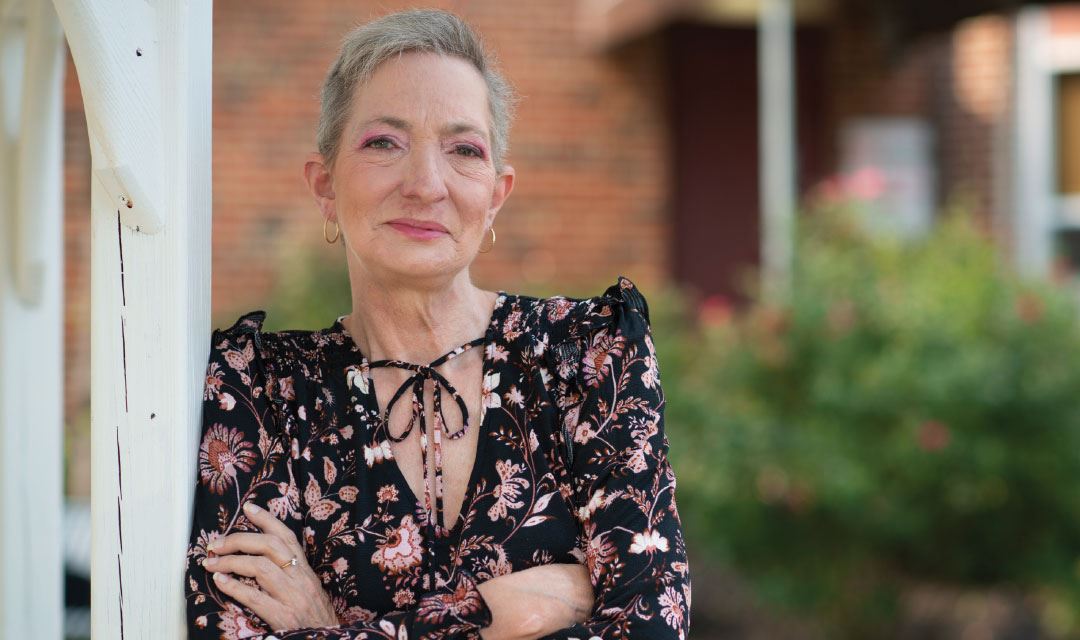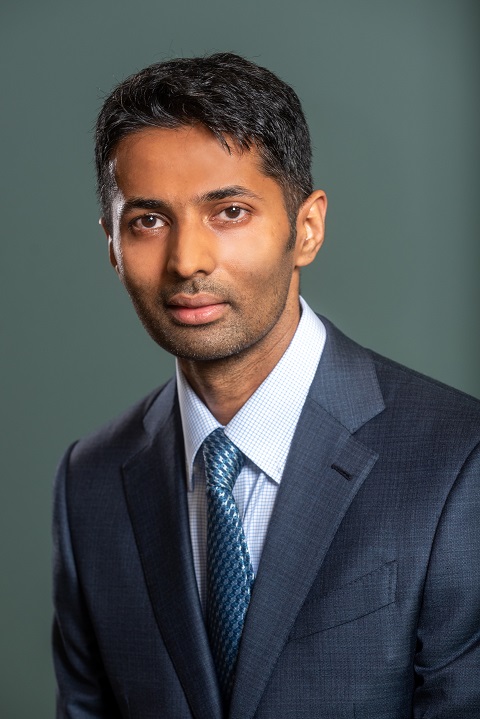“My motto is, ‘Cancer’s not going to rule me. I’m gonna rule the cancer.’”

On September 26, 2019, Carteret resident Cindy Bryer was engaged in her normal morning routine. The 54-year-old had finished her coffee and was getting ready to go for a walk in the park with her daughter. While she had experienced a bit of coughing, “I thought it was just smoker’s cough,” she says. “Otherwise, nothing was really bothering me healthwise.”
But minutes later, she felt a severe burning in her throat. Her daughter called 911, and EMS crews rushed her to Robert Wood Johnson University Hospital (RWJUH) Rahway. “I remember the drive, and I remember being right outside the emergency entrance,” Cindy says. “Then I looked at one of the EMTs, and everything went dark.”
Cindy had suffered ventricular fibrillation—a rapid, life-threatening heartbeat that caused her to pass out. A team of doctors rushed to her side. “Because she had chest pain, shortness of breath and had become unconscious, we did a full workup on her,” says Pawan Gundavaram, MD, a medical oncologist at RWJUH Rahway and a member of RWJBarnabas Health Medical Group, who saw Cindy in the Emergency Department that day.

Imaging studies revealed some sobering news: Cindy had a 4.1-centimeter mass in the upper lobe of her left lung. She had also developed multiple lesions on both sides of her brain that were causing her brain to swell. A CT-guided biopsy of the mass confirmed a diagnosis of stage 4 metastatic lung cancer.
“I don’t think they expected me to go home again,” Cindy says.
Choosing to Fight
At first, Cindy struggled to process the news. “I was very upset,” she recalls. “I worried about not being able to see my grandkids get married or graduate high school.”
The unfortunate reality, according to Dr. Gundavaram, is that many patients diagnosed with stage 4 lung cancer choose not to seek treatment. “Stage 4 is a very aggressive cancer, and if it’s left untreated, people usually only have three to four months to live,” he says. “Some people give up at that point.”

But Cindy, after much reflection, decided to get her cancer treated. Her team at RWJUH Rahway attacked her cancer with three approaches. First came radiation therapy, led by radiation oncologist Eric Karp, MD, which directed radioactive beams to the lesions in her lung and brain.
Next came a combination of chemotherapy, a drug treatment that kills cancer cells, and immunotherapy, which uses the patient’s own immune system to treat specific tumor mutations. “We have about 15 different tumor mutations we can treat now with immunotherapy, based on a patient’s biologic markers, thanks to advances in medications and the sophisticated testing we do,” Dr. Gundavaram says.
Cindy tested positive for PDL1- positive lung cancer, a subtype that makes up about 10 to 15 per cent of lung cancer cases in the U.S., according to the American Lung Association. “Her tumor had a high expression of the marker PDL1, which meant it would be more responsive to immunotherapy,” Dr. Gundavaram says.
Phases of Treatment
From January through April 2020, Cindy underwent the induction phase of chemotherapy, designed to shrink her lesions. She received infusions during six four-and-a-half-hour sessions.
After the initial phase, she started maintenance immunotherapy, designed to keep the cancer at bay with minimal side effects. She received an infusion for 30 minutes every three to six weeks. All treatments took place in the Oncology Infusion Center on the third floor of RWJUH Rahway.
Throughout her journey, Cindy relied on her friends and family members, who drove her to her treatments and provided an emotional lift. “I have my good and bad days,” she says. “On those days I feel ‘boo-hoo’ for myself, they try to get me out of the ‘boo-hoos.’”
She says she appreciated the way Dr. Gundavaram communicated with her. “He told me about everything up front—and I’m a pretty straightforward person, so I liked that,” she says. “He truly listened, and he respected everything I said about what I wanted to do during treatment and what I wouldn’t do. I couldn’t have asked for a better doctor.”
Two years after her diagnosis, Cindy’s lung cancer has stabilized. The mass on her lung is smaller. “It almost looks like a small scab now,” she says. The lesions on her brain are no longer visible on imaging. She’s also quit smoking. Despite having advanced lung cancer, she doesn’t have to use oxygen. And while she battles some fatigue and joint pain from her treatment, Cindy is keeping up her fighting spirit. “My motto is, ‘Cancer’s not going to rule me. I’m gonna rule the cancer,’” she says.
Infusion Care Designed with Patients in Mind
The Oncology Infusion Center at RWJUH Rahway offers patients a calm, private area for cancer treatments. Located on the hospital’s third floor, it includes 12 infusion chairs and a team of chemotherapy nurses with advanced training and many years of experience.
“It’s a one-stop shop for patients,” says medical oncologist Pawan Gundavaram, MD. “Because it’s hospital-based, we have access to patients’ imaging test results. We can perform quick-turnaround lab tests. Patients who need radiation therapy can receive it right next door. And if any dangerous side effects occur, patients can get immediate care in our Emergency Department.”
For longer-term infusions, patients can order breakfast or lunch from a menu and have it delivered directly to the Oncology Infusion Center.
To make an appointment for infusion services at RWJUH Rahway, call 732-499-6207.
To connect with a cancer specialist at RWJUH Rahway, call 844.CANCERNJ (844-226-2376).